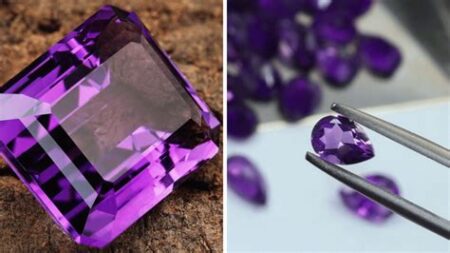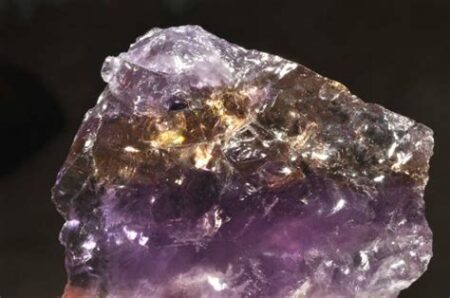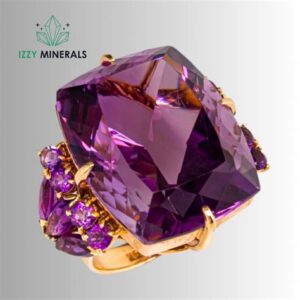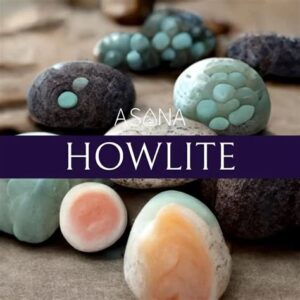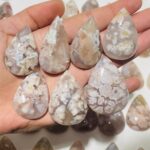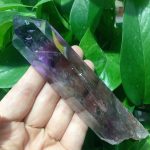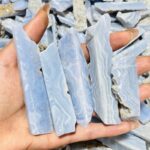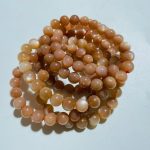Chalcedony: The Gem with a Colorful Past
Chalcedony is a cryptocrystalline variety of silica, composed primarily of a mix of quartz and moganite. It is characterized by its waxy luster, vitreous sheen, and wide range of colors, including white, gray, blue, pink, purple, yellow, orange, and green. Chalcedony is a popular gemstone, often used in jewelry and decorative objects.
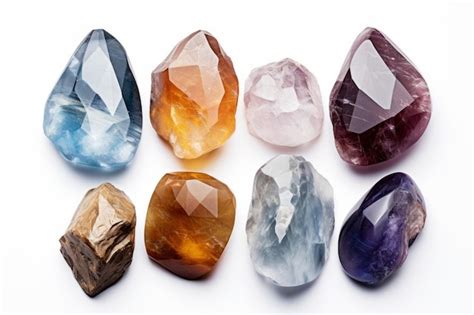
Pronunciation Guide: Breaking Down Chalcedony
The pronunciation of chalcedony has often been a source of confusion. Here’s a step-by-step guide to pronouncing it correctly:
- Divide the word into syllables: Chal-ce-do-ny
- Pronounce the first syllable: “Chal” with a hard “c” sound, as in “cat.”
- Pronounce the second syllable: “ce” with a soft “e” sound, as in “bed.”
- Pronounce the third syllable: “do” with a short “o” sound, as in “dog.”
- Pronounce the fourth syllable: “ny” with a long “e” sound, as in “eye.”
Historical and Cultural Significance: Chalcedony’s Global Impact
Chalcedony has been esteemed for its beauty for centuries. It was particularly prized by the ancient Greeks, who named it after the port city of Chalcedon (modern-day Kadıköy, Turkey), where it was traded extensively. In ancient Egypt, chalcedony was used in amulets believed to protect against evil spirits. During the Middle Ages, chalcedony was incorporated into religious artifacts and rosaries, symbolizing purity and divine favor.
The Alluring Spectrum of Chalcedony Colors
The chromatic diversity of chalcedony is astounding. Each color variety carries its own unique allure and significance:
- White chalcedony: Milky white in appearance, this variety is known as “common chalcedony” and is the most abundant.
- Gray chalcedony: Ranging from light gray to dark graphite, gray chalcedony is often used as an ornamental gemstone.
- Blue chalcedony: Known as “blue lace agate,” this variety displays delicate, lace-like patterns of blue.
- Pink chalcedony: Ranging from pale blush to vibrant rose, pink chalcedony is associated with love and harmony.
- Purple chalcedony: Variegated with shades of purple, this variety is commonly known as “ametrine” when combined with amethyst.
- Yellow chalcedony: Golden in hue, yellow chalcedony symbolizes creativity and optimism.
- Orange chalcedony: Showcasing a fiery orange, this variety is often called “carnelian” and is believed to promote vitality.
- Green chalcedony: Ranging from pale sage to emerald, green chalcedony is associated with nature and prosperity.
Beautiful Ornamental Applications of Chalcedony
Chalcedony has widespread applications in the decorative arts:
- Jewelry: Chalcedony is widely used in jewelry-making, adorning rings, necklaces, earrings, and bracelets. Its versatility allows for a range of settings, from delicate to bold.
- Home Decor: Chalcedony has found its way into home decor, where it adds a touch of elegance and sophistication. It can be incorporated into vases, bowls, lamps, and decorative figurines.
- Sculptures: Chalcedony’s unique grain patterns and textures have inspired artists to create intricate sculptures and carvings. These works of art are often displayed in galleries and private collections.
Practical Benefits: Chalcedony’s Versatility
Beyond its aesthetic appeal, chalcedony offers a range of practical benefits:
- Healing Properties: Chalcedony is believed to possess healing properties, particularly in promoting emotional balance, clarity, and communication.
- Industrial Applications: Chalcedony’s hardness makes it suitable for industrial applications. It is used in the production of grinding wheels, abrasives, and refractory materials.
Tips and Tricks: Enhancing Chalcedony’s Beauty
- Cleaning: To maintain chalcedony’s luster, it should be cleaned regularly with a mild detergent and warm water.
- Storage: Chalcedony jewelry and decorative items should be stored in a cool, dry place to prevent scratching.
- Protection: Protect chalcedony from extreme heat or cold, as sudden temperature changes can cause it to crack.
Common Mistakes to Avoid: Maintaining Chalcedony’s Integrity
- Harsh Chemicals: Avoid using harsh chemicals or abrasive cleaners to clean chalcedony, as these can damage its delicate surface.
- Ultrasonic Cleaning: Ultrasonic cleaning should not be used on chalcedony, as it can cause the gemstone to become brittle.
- Exposure to Heat: Protect chalcedony from prolonged exposure to heat, as high temperatures can alter its color and structure.
Table 1: Physical Properties of Chalcedony
| Property | Value |
|---|---|
| Chemical formula | SiO₂ |
| Crystal structure | Cryptocrystalline |
| Mohs hardness | 6.5-7 |
| Specific gravity | 2.60-2.64 |
| Cleavage | None |
| Fracture | Conchoidal |
| Luster | Waxy |
| Sheen | Vitreous |
| Color | White, gray, blue, pink, purple, yellow, orange, green |
Table 2: Healing Properties of Chalcedony
| Attribute | Benefit |
|---|---|
| Emotional balance | Promotes emotional stability and well-being |
| Clarity | Enhances clarity of thought and improves communication |
| Throat chakra | Supports healthy communication and self-expression |
| Inner peace | Facilitates a sense of inner peace and tranquility |
| Spiritual growth | Encourages spiritual development and self-awareness |
Table 3: Industrial Applications of Chalcedony
| Application | Purpose |
|---|---|
| Grinding wheels | Used in grinding and polishing processes |
| Abrasives | Utilized in cutting and shaping materials |
| Refractory materials | Employed in high-temperature applications |
| Chemical industry | Used in the production of silicon-based chemicals |
Table 4: Pronunciation Guide for Chalcedony Variants
| Variant | Pronunciation (Phonetic Spelling) |
|---|---|
| Chalcedony | [kal-sə-dō-nē] |
| Blue lace agate | [bloo las ā-git] |
| Carnelian | [kär-nēl-yən] |
| Chrysoprase | [kris-ō-prās] |
| Onyx | [ō-niks] |

